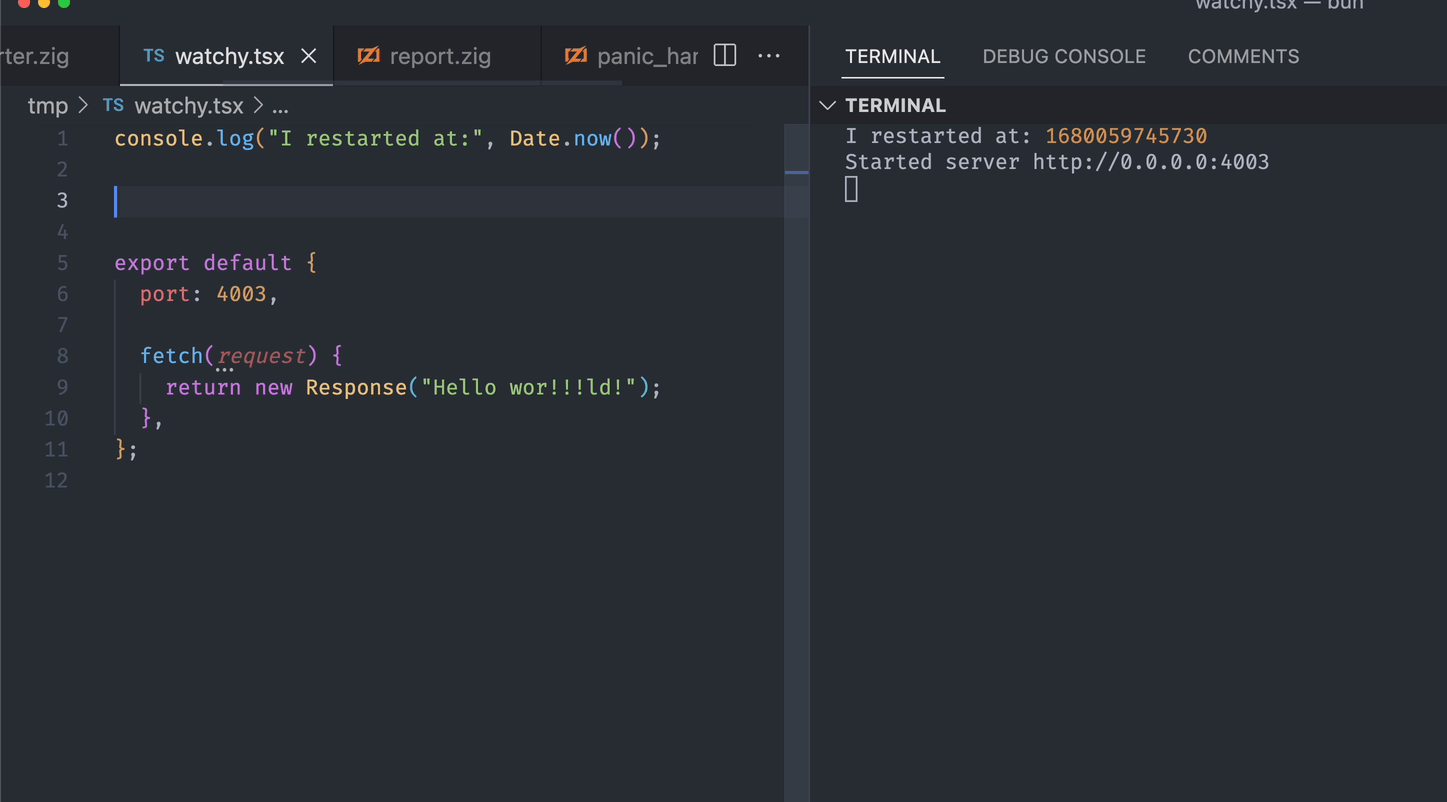diff options
Diffstat (limited to 'docs/runtime/hot.md')
| -rw-r--r-- | docs/runtime/hot.md | 19 |
1 files changed, 9 insertions, 10 deletions
diff --git a/docs/runtime/hot.md b/docs/runtime/hot.md index 4c344f4dc..6ca9f3d71 100644 --- a/docs/runtime/hot.md +++ b/docs/runtime/hot.md @@ -52,6 +52,7 @@ serve({ {% /codetabs %} +In this example, Bun is  Running `bun test` in watch mode and `save-on-keypress` enabled: @@ -64,7 +65,9 @@ $ bun --watch test ## `--hot` mode -Use `bun --hot` to enable hot reloading when executing code with Bun. +Use `bun --hot` to enable hot reloading when executing code with Bun. This is distinct from `--watch` mode in that Bun does not hard-restart the entire process. Instead, it detects code changes and updates its internal module cache with the new code. + +**Note** — This is not the same as hot reloading in the browser! Many frameworks provide a "hot reloading" experience, where you can edit & save your frontend code (say, a React component) and see the changes reflected in the browser without refreshing the page. Bun's `--hot` is the server-side equivalent of this experience. To get hot reloading in the browser, use a framework like [Vite](https://vite.dev). ```bash $ bun --hot server.ts @@ -99,15 +102,13 @@ Traditional file watchers like `nodemon` restart the entire process, so HTTP ser ### HTTP servers -Bun provides the following simplified API for implementing HTTP servers. Refer to [API > HTTP](/docs/api/http) for full details. +This makes it possible, for instance, to update your HTTP request handler without shutting down the server itself. When you save the file, your HTTP server will be reloaded with the updated code without the process being restarted. This results in seriously fast refresh speeds. ```ts#server.ts -import {serve} from "bun"; - globalThis.count ??= 0; globalThis.count++; -serve({ +Bun.serve({ fetch(req: Request) { return new Response(`Reloaded ${globalThis.count} times`); }, @@ -115,18 +116,16 @@ serve({ }); ``` -The file above is simply exporting an object with a `fetch` handler defined. When this file is executed, Bun interprets this as an HTTP server and passes the exported object into `Bun.serve`. - -When you save the file, your HTTP server will be reloaded with the updated code without the process being restarted. This results in seriously fast refresh speeds. +<!-- The file above is simply exporting an object with a `fetch` handler defined. When this file is executed, Bun interprets this as an HTTP server and passes the exported object into `Bun.serve`. --> -{% image src="https://user-images.githubusercontent.com/709451/195477632-5fd8a73e-014d-4589-9ba2-e075ad9eb040.gif" alt="Bun vs Nodemon refresh speeds" caption="Bun on the left, Nodemon on the right." /%} +<!-- {% image src="https://user-images.githubusercontent.com/709451/195477632-5fd8a73e-014d-4589-9ba2-e075ad9eb040.gif" alt="Bun vs Nodemon refresh speeds" caption="Bun on the left, Nodemon on the right." /%} --> {% callout %} **Note** — In a future version of Bun, support for Vite's `import.meta.hot` is planned to enable better lifecycle management for hot reloading and to align with the ecosystem. {% /callout %} -{% details summary="Implementation `details`" %} +{% details summary="Implementation details" %} On hot reload, Bun: |
